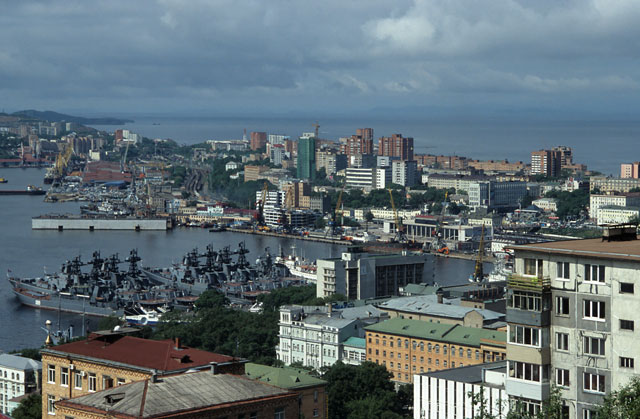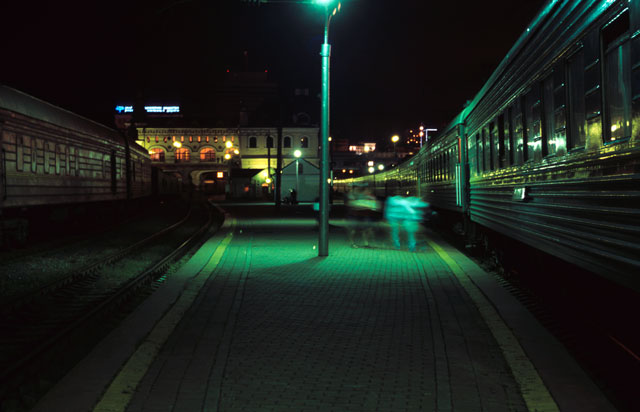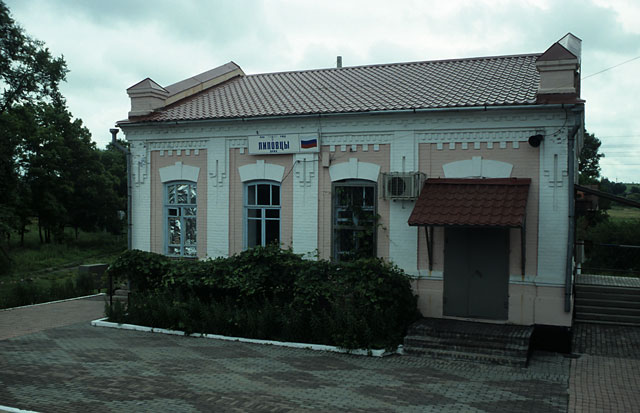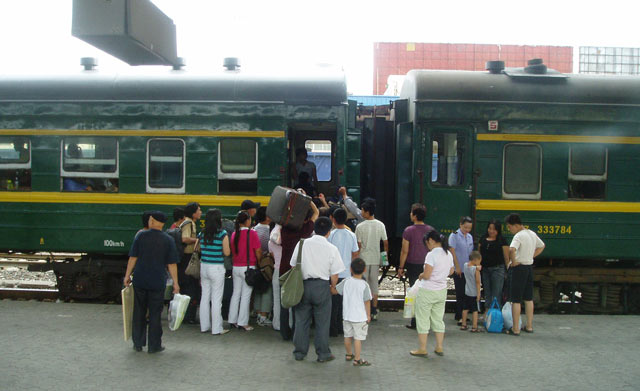
Our itinerary said that we would be met and taken to "a central location", but the the railway station in Vladivostok is about as central as you can get. We waited for some time anyway, but nobody turned up. We looked for the left luggage place on the station and eventually found it, so we were able to leave our main bags there. We now had until just before midnight to explore the city.
I had previously imagined Vladivostok to be a grim place, but the Lonely Planet guidebook said it was well worth a couple of days stay. The city is in an attractive setting surrounded by sea, and the best place to appreciate this is from a hill reached by a funicular. We walked to the bottom station of the funicular only to find that it wasn't operating, so we then had to walk to the top of the hill. There were indeed some good views, but it was rather cloudy. We were also hoping that there would be a café or restaurant at the top, but there wasn't, and we were now getting quite hungry, not having had any breakfast.
We walked back down into the centre of town, and found a steak restaurant, so we called in there for lunch. It was quite expensive, and our choices were limited by the amount of roubles we still had. I had fish soup followed by grilled chicken.
After lunch we walked to the beach area, as we thought there might be some boat trips from there, but we couldn't see any. By now, it was sunny and getting quite warm, so we bought ice creams at a kiosk. We walked back across town to the harbour (on the other side of the peninsula) and the ferry terminal, where we studied the timetables and worked out that we could do a round trip to Russkiy Island later in the afternoon. We were unsure of what to do in the meantime: Tim suggested visiting a museum, but Bill and I just fancied sitting down with a beer, so that's what we did, at a stall just by the harbour. There were two Russian guys sat near us, and they started talking to us. They were rap artists called Swifty and Dog Z. We spotted Laura and Francesca (the Italians from the train) walking past, and they joined us for a while.
When it was time, we boarded our ferry, along with our rapper friends who were also travelling out to Russkiy island. There were no seats on the ferry, and passengers found a space wherever they could among the road vehicles. It was about a two hour round trip, calling at two places on the island before returning to Vladivostok, and was very pleasant in the evening sunshine.

|
View of the harbour area of Vladivostok |
For our evening meal, we chose the "Nostalgie" restaurant from our guidebook, as it was near the station. We asked at the door if they took credit cards, as we didn't have many roubles left, and didn't want to get any more as it was our last day in Russia. We had a good meal, and then found that they would not accept credit cards: "Visa closes at 8 o'clock", they said. I volunteered to go in search of a cash machine, and eventually found one after a long walk via the station and the town centre. Of course, there was one quite near the restaurant, if only I had turned left instead of right.
 We returned to the station to collect our luggage, and boarded the 23.53
to Harbin - a very slow train. In fact, there was just a single coach
for Harbin, tagged onto the back of the train to Blagoveshchensk. The train
was so long that it was off the end of the platform, and we had to walk along
the track in order to board. The train took us back along the Trans-Siberian
main line as far as Ussuriysk, where the Harbin coach was detached and left
in a siding for the rest of the night, which at least ensured us a good night's
sleep.
We returned to the station to collect our luggage, and boarded the 23.53
to Harbin - a very slow train. In fact, there was just a single coach
for Harbin, tagged onto the back of the train to Blagoveshchensk. The train
was so long that it was off the end of the platform, and we had to walk along
the track in order to board. The train took us back along the Trans-Siberian
main line as far as Ussuriysk, where the Harbin coach was detached and left
in a siding for the rest of the night, which at least ensured us a good night's
sleep.

|
Late night on Vladivostok station. The train to Blagoveshchensk (right) conveys the through coach to Harbin, as far as Ussuriysk. |
I woke some time after 7 o'clock, when our coach was shunted around to form the train for the next stage of the journey, from Ussuriysk to the border at Grodekovo. On this section, our train consisted of just three coaches: our coach from Vladivostok, a through coach from Khabarovsk, and one coach for local passengers between Ussuriysk and Grodekovo. Our coach had 6 passengers: the three of us, a Russian couple and a Swiss man. The route we were on was part of the original Trans-Siberian railway, via Harbin, which declined in importance after completion of the current, longer route in 1916, which stays within Russian territory. The train was less modern than the "Rossiya", and had no air-conditioning, but was reasonably comfortable.
The border station on the Russian side is called Grodekovo I, but the town it serves is shown as Pogranichniy (= on the border) on some maps. We arrived here at midday, and all passengers had to leave the train, with luggage, and proceed to the customs and immigration hall on the station. Here we waited, and waited. We were able to visit a shop across the road from the station, where we bought some savoury filled doughnuts and cake for lunch. There were many people here, most of whom had come by road, as it only takes 3-4 hours, compared to the 12 hours it had taken us by train.

|
The station building at Livotsi, between Ussuriysk and the Chinese border. |
I occupied some of the time by doing a crossword and listening to my iPod. A train arrived from China, and hundreds of passengers disembarked, loaded up with goods bought cheaply in China. At 16.40, about 4½ hours after we arrived, some people left the waiting room and went downstairs into the border control area. Everybody else (about 200 people) followed, and it was chaos, as people were still coming through from the Chinese side, dragging heavy blue and white canvas bags loaded with what looked like clothing. Eventually, they started processing us, and this involved showing our passport at various desks and windows. Many passengers were having all their luggage examined, but we were waved through and managed to avoid this.
We rejoined the train, where the two through Russian coaches had had their bogies changed from Russian broad gauge to standard gauge, and had been attached to a set of Chinese coaches. The section across the border was quite scenic, with forested hills, but we thought it best not to take any photographs. At the border, those of us on Russian local time put our watches back 3 hours to Beijing time, while Tim (on Moscow time) put his forward 4 hours.
The train was also booked to stop at Suifenhe, the Chinese border town, for a few hours, and we feared that we might have a repeat of all the waiting that we did on the Russian side. In fact, the border formalities were carried out efficiently and politely on the train shortly after we arrived. After that, we were free to leave the train, and our Russian provodnitsa made sure that we knew what time it was and when the train departed. The train was not in the station, so we climbed down onto the tracks and went through a gap in the fence.
We walked towards the centre of the town, looking for a cash machine without success. We thought we would try the Opal Hotel, as we should be able to change money and have a meal there. They were unable to change money at the reception desk, despite having exchange rates displayed behind the desk, although as they included French Francs and Deutsche Marks we suspected that they hadn't been updated for a few years. But the hotel staff knew someone who could help, and they invited us to sit down and have some tea while we waited.
A man arrived with a suitcase full of money, and we agreed on a rate of 7.9 Yuan to the US Dollar, although we only had a rough idea of what the official rate was. Once we had some funds, we were led into the hotel restaurant, and given a private room. The menu was only in Chinese, and although it had some pictures, they were not very clear. One of the staff spoke a little English, and with his help we managed to order some venison (which was very good), some seafood (possibly octopus), some squidgy strips of something (possibly some other form of seafood, not very nice) and spinach. I was able to show off my own limited Chinese vocabulary by ordering rice, beer and tea. We were given VIP treatment throughout the meal, and this was quite overbearing, with one of the waiters, who spoke fairly good English, wanting to talk with us continually as we ate. I think all the other hotel staff also visited us, either to say a few words in English if they could, or just to look at us if they couldn't. After we had finished eating, we showed photographs of home and exchanged a few British coins for Chinese ones. The bill came to about £10 for the three of us.
We walked back to the station, rejoined our train and went to bed fairly soon after departure.
It was raining heavily as we approached Harbin. We were met on the station, as expected, and taken by minibus to the Gloria Inn hotel. We had nothing arranged for our day in Harbin, but our guide, Eric, offered us a trip to the Siberian Tiger Park for a reasonable price, and we took up this offer. First, though, we had breakfast and a much-needed shower.
The Tiger Park is a few km outside Harbin, and we were taken there by minibus. In the park, groups of tourists are taken round by special bus, which gave us chances to get fairly close to the tigers. The park holds perhaps 200 Amur tigers (also known as Siberian or Manchurian tigers), and aims to prevent the extinction of this critically-edangered sub-species by breeding them and releasing them into the wild. Critics doubt whether the tigers, fed regular meals by their keepers, will stand much chance of survival in the wild. One of the less tasteful practices of the park is to allow visitors to pay for live animals to be fed to the tigers. We saw chickens and ducks, trussed up to prevent them flying, being fed to the tigers, and the price list displayed at the entrance included cows for Y1500.

|
An Amur tiger in the park in Harbin. Only a few hundred of these tigers remain in the wild. |
In the afternoon we took a ferry across the river to Sun Island, which has a large park, although we didn't go in it. Instead we walked around the edge of the park to the cable car, which carried us back over the river into the town. Not many people were using the cable car: hardly surprising, as it cost Y50 compared with just Y2 for the ferry. We then walked the full length of the main shopping street, Zhongyang Dajie, which is pedestrianised (rare for China), and back to the hotel via the former Russian Orthodox Church (now housing a display of historic photographs of Harbin) and Zhaolin Park.
We walked along Zhongyang Dajie again in the evening, looking for a suitable restaurant, but without success. We consulted a guidebook, and decided to head for a recommended restaurant down a side street. There was no English menu, and not even any pictures to help this time, so we resorted to a phrase book, and pointed out the phrase "What can you recommend?" to the waiter. He pointed to a few items in the menu, and we said "OK", without having a clue what they were. We were able to order beer and rice, though. The food which arrived included duck (nice but messy), some crispy fried stuff (possibly fish), two whole fish (excellent) and stir-fried vegetables. It turned out to be a good meal, and very good value at Y83 (about £5.50) for the three of us.
Bill's alarm went off an hour early, as it was still on Irkutsk time. We got up at 5.45, had a cup of tea, then checked out and collected packed breakfasts from reception (we were too early for the restaurant). We were due to be collected at 6.30, but Eric and the minibus were a bit late arriving. The traffic was horrendous, even by Chinese standards, and we bailed out of the minibus as near to the station as we could get, then made our way on foot. Eric led us at a fast pace through the station, taking us through the "Mother & Baby Waiting Room" to get to the platform with less than 10 minutes to spare.
 Our train departed on time at 7.25. It was a quite modern, comfortable, air-conditioned
train, and our compartment was of the "soft sleeper" type, even though
this was a daytime service. We ate our packed breakfasts, which were a selection
of items from the buffet, such as sausage, dumplings, boiled egg, vegetables
and a bottle of water. It was a fast train by Chinese standards, running
at a top speed of 130km/h (80mph). Tim, who had been monitoring our speeds throughout
the journey, with stopwatch and GPS, informed us that this was the fastest we
had gone since Poland.
Our train departed on time at 7.25. It was a quite modern, comfortable, air-conditioned
train, and our compartment was of the "soft sleeper" type, even though
this was a daytime service. We ate our packed breakfasts, which were a selection
of items from the buffet, such as sausage, dumplings, boiled egg, vegetables
and a bottle of water. It was a fast train by Chinese standards, running
at a top speed of 130km/h (80mph). Tim, who had been monitoring our speeds throughout
the journey, with stopwatch and GPS, informed us that this was the fastest we
had gone since Poland.
During the course of the morning, two members of the train crew ("trolley man" and "trolley woman") had been going up and down the train with a trolley, selling food and drink. At around midday, when we were beginning to feel a bit peckish, we decided to stop "trolley man" and see what he was offering. On this trip, he only had ice cream, so we declined his offerings and went to the restaurant car instead. For Y25 (£1.75) we were given a tray, and we could then help ourselves to a selection of dishes laid out at one end of the dining car. Although we couldn't be sure what it was that we were eating, it was an enjoyable lunch.
From the train, the contrast between urban and rural life in China was clearly visible. Changchun and Shenyang were gleaming, modern cities with lots of construction work going on. In between were fields being worked by manual labour.
The crossword, from The Independent, was a tough one today, but we eventually cracked it.
As we approached Beijing in the early evening, the skies darkened and it started to rain. By the time we arrived, it was torrential. We were met on the platform by Roger (Tim's brother), his wife Juliette, and children Peter and Alison. Outside the station, the streets were awash with water, and we tried to hail a taxi, without success as hundreds of other people also wanted taxis. We gave up, and returned to the station and took the subway (metro) to Dongzhimen, then we were able to get a taxi from there to the Yuyang Hotel. Bill and I checked in there, and had the luxury of single rooms with king-size beds at a very favourable rate. Tim was staying at Roger's flat.
We all met up again later in the evening for a meal near the hotel.

|
Passengers boarding a train at Qinhuangdao station, Hebei province. |
After a good night's sleep, it was a real pleasure to wake up naturally, without an alarm clock. I put the TV on for the news, for the first time in about 2 weeks. Trouble in the Middle East, so nothing new really. The weather forecast predicted 25C in Beijing, but 28C in London.
Bill and I had nothing planned for the day, as Tim and Roger would be going to the airport to meet Tim's family. We had a leisurely breakfast at the hotel, then bought some postcards and wrote them.
We took a taxi to Tiananmen Square in the afternoon, and had a walk around. It was warm and humid, and there was a thick haze or smog. We were continually hassled by people in the square, coming to talk to us and then asking if we had been to some museum or other. I think they were being employed to entice visitors to various tourist attractions.
We escaped from the bustle of the square by going through the underpass towards the Forbidden City. Here, we were mobbed by people wanting to act as tour guides for us. We had no intention of going into the Forbidden City, having been there twice before, and we headed instead for the relative peace of Zhongshan Park. The skies darkened, an ominous breeze developed, and a few heavy drops of rain fell. We made for a tea house and got there just as the heavens opened. We spent the next two hours sipping green tea, watching the lightning, and waiting for the rain to subside.

|
The approach to the Forbidden City from Tiananmen Square. |
We had to leave at six, even though it was still raining heavily, as we had arranged to meet Roger at our hotel at seven. Our first problem was that we didn't have enough money for a taxi, which was the only practical means of getting to the hotel as we didn't know where it was in relation to any metro stations. We tried the Beijing Hotel (massively extended since my 1988 visit) but they wouldn't allow non-residents to change money. We continued to a branch of the Bank of China and got some cash from an ATM, but even that was a struggle as it randomly threw up questions in Chinese, despite selecting English at the start of the transaction. A map displayed outside a very smart new shopping centre enabled us to find a metro station, from where we were able to get to Dongzhimen without any difficulty. Our next problem was a lack of taxis, and a huge queue for them. We sent a text message to say that we would be late, and Juliette phoned to give us walking directions to the restaurant, which wasn't far away. But we missed it, and walked much further, and it required another phone call and a rendezvous with Tim on a street corner before we eventually got there. A journey which could have been done in 20 minutes had taken us two hours, and we got absolutely soaked.
In the restaurant, we were greeted by Tim's family (wife Tine, children Katrina and Tatiana) as well as Roger's, and we eagerly tucked into the food. The beer was also very much needed. We finished the meals with toffee apples, which were very popular.
Bill and I said goodbye to the Calow families, and as it had stopped raining we were able to walk back to the hotel, which took about 10-15 minutes.
The journey home was fairly unremarkable: taxi to the airport, flight BA38 departed at 11.25, a 10½-hour flight to Heathrow. We both used the Heathrow Express to get to Paddington, then went our separate ways. Bill went by Eurostar from Waterloo to his home in Brussels, while I caught the 17.30 GNER service from King's Cross to York.